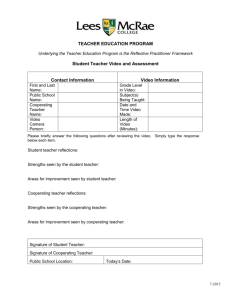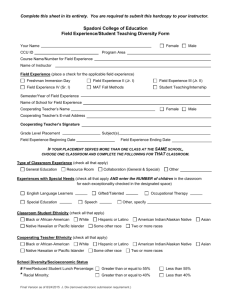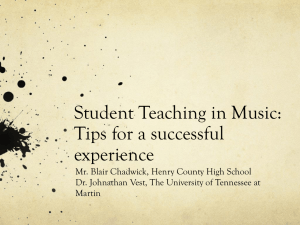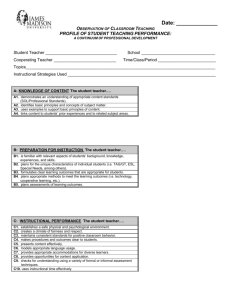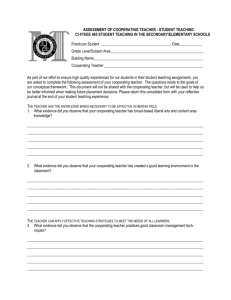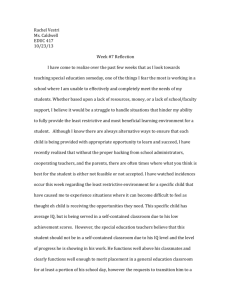Establishing Positive Relationships During the Student Teaching Experience
advertisement
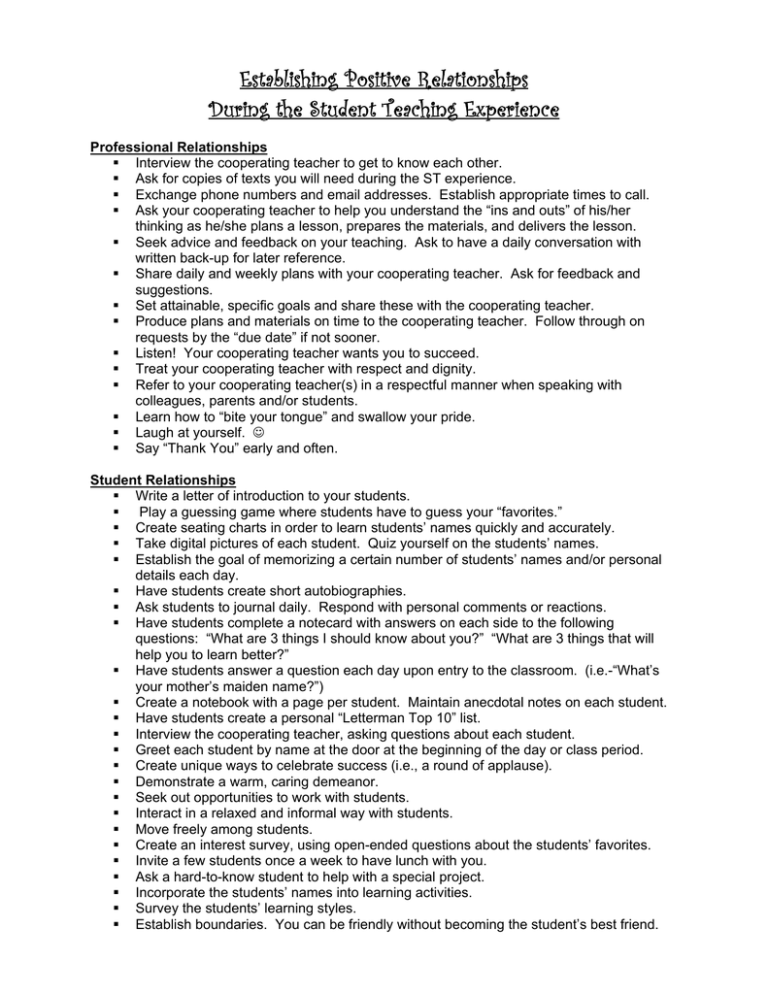
Establishing Positive Relationships During the Student Teaching Experience Professional Relationships Interview the cooperating teacher to get to know each other. Ask for copies of texts you will need during the ST experience. Exchange phone numbers and email addresses. Establish appropriate times to call. Ask your cooperating teacher to help you understand the “ins and outs” of his/her thinking as he/she plans a lesson, prepares the materials, and delivers the lesson. Seek advice and feedback on your teaching. Ask to have a daily conversation with written back-up for later reference. Share daily and weekly plans with your cooperating teacher. Ask for feedback and suggestions. Set attainable, specific goals and share these with the cooperating teacher. Produce plans and materials on time to the cooperating teacher. Follow through on requests by the “due date” if not sooner. Listen! Your cooperating teacher wants you to succeed. Treat your cooperating teacher with respect and dignity. Refer to your cooperating teacher(s) in a respectful manner when speaking with colleagues, parents and/or students. Learn how to “bite your tongue” and swallow your pride. Laugh at yourself. ☺ Say “Thank You” early and often. Student Relationships Write a letter of introduction to your students. Play a guessing game where students have to guess your “favorites.” Create seating charts in order to learn students’ names quickly and accurately. Take digital pictures of each student. Quiz yourself on the students’ names. Establish the goal of memorizing a certain number of students’ names and/or personal details each day. Have students create short autobiographies. Ask students to journal daily. Respond with personal comments or reactions. Have students complete a notecard with answers on each side to the following questions: “What are 3 things I should know about you?” “What are 3 things that will help you to learn better?” Have students answer a question each day upon entry to the classroom. (i.e.-“What’s your mother’s maiden name?”) Create a notebook with a page per student. Maintain anecdotal notes on each student. Have students create a personal “Letterman Top 10” list. Interview the cooperating teacher, asking questions about each student. Greet each student by name at the door at the beginning of the day or class period. Create unique ways to celebrate success (i.e., a round of applause). Demonstrate a warm, caring demeanor. Seek out opportunities to work with students. Interact in a relaxed and informal way with students. Move freely among students. Create an interest survey, using open-ended questions about the students’ favorites. Invite a few students once a week to have lunch with you. Ask a hard-to-know student to help with a special project. Incorporate the students’ names into learning activities. Survey the students’ learning styles. Establish boundaries. You can be friendly without becoming the student’s best friend. Parent Relationships Write a letter of introduction to the parents at the beginning of the ST experience. Write a letter of explanation to the parents at the beginning of each new unit of study. Call parents with positive news about their children. Follow up with problems or concerns immediately. Waiting can create problems. Treat parents and guardians with respect and dignity. Learn how to “bite your tongue” and swallow your pride. Laugh at yourself. ☺ Admit mistakes graciously. Create weekly reports or newsletters to keep parents informed. Invite parents to be part of the team. The focus should always be on the student. Proofread assignments and written communications carefully. These should be errorfree. Listen, especially “between the lines.” Use reflective listening techniques. Administrative Relationships Introduce yourself to the building administrator(s) and other staff early in the student teaching experience. Thank the building administrator for approving and/or arranging your student teaching experience. Invite the administrator to observe you teaching at least once during the student teaching experience. Provide a lesson plan for his/her reference. Thank him/her for his/her time following the lesson. Ask the administrator for professional advice during the hiring process (resume, job search process, hints for the interview, etc.) Treat the administrator with respect and dignity. Address him/her as “Mr. Smith” or “Ms. Jones”. Refer to the administrator in a respectful manner when speaking with colleagues, parents and/or students. References: Enz, B. J., Hurwitz, S. C. & Carlile, B. J. (2007). Coaching the Student Teacher: A Developmental Approach (4th ed.). Dubuque IA: Kendall/Hunt Publishing. Enz, B. J., Hurwitz, S. C. & Carlile, B. J. (2007). The Student Teaching Experience: A Developmental Approach (4th ed.). Dubuque IA: Kendall/Hunt Publishing. Goethals, M. S., & Howard, R. A. (2000). Student Teaching: A Process Approach to Reflective Practice. (1st ed.) Upper Saddle River NJ: Merrill Prentice Hall. Goethals, M. S., Howard, R. A. & Sanders, M. M. (2004). Student Teaching: A Process Approach to Reflective Practice. (2nd ed.) Upper Saddle River NJ: Pearson Merrill Prentice Hall. Pelletier, C. M. (2004). Strategies for Successful Student Teaching: A Comprehensive Guide (2nd ed.). Boston, MA: Pearson Allyn Bacon.
